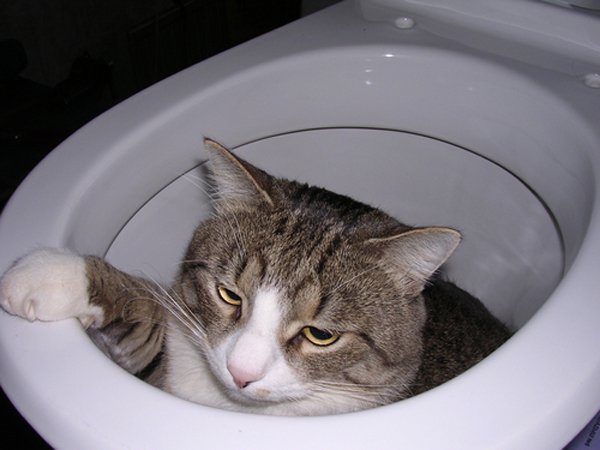Reasons You Must Never Flush Cat Poop Down Your Toilet - Important Facts
Reasons You Must Never Flush Cat Poop Down Your Toilet - Important Facts
Blog Article
What are your opinions on Can You Flush Cat Poop Down The Toilet??

Introduction
As feline proprietors, it's vital to be mindful of exactly how we dispose of our feline pals' waste. While it might seem practical to flush feline poop down the bathroom, this technique can have detrimental consequences for both the environment and human health.
Alternatives to Flushing
Fortunately, there are safer and extra liable means to throw away feline poop. Consider the adhering to options:
1. Scoop and Dispose in Trash
The most usual technique of dealing with cat poop is to scoop it into an eco-friendly bag and throw it in the trash. Make sure to make use of a specialized clutter scoop and deal with the waste immediately.
2. Usage Biodegradable Litter
Go with eco-friendly pet cat clutter made from materials such as corn or wheat. These litters are environmentally friendly and can be safely gotten rid of in the garbage.
3. Bury in the Yard
If you have a lawn, take into consideration hiding cat waste in an assigned location away from veggie gardens and water resources. Make sure to dig deep enough to prevent contamination of groundwater.
4. Mount a Pet Waste Disposal System
Purchase a pet dog waste disposal system particularly designed for cat waste. These systems make use of enzymes to break down the waste, reducing odor and environmental effect.
Health and wellness Risks
Along with ecological problems, flushing feline waste can additionally posture health and wellness risks to humans. Cat feces may include Toxoplasma gondii, a parasite that can trigger toxoplasmosis-- a potentially severe illness, particularly for expectant females and individuals with weakened body immune systems.
Environmental Impact
Purging feline poop introduces harmful virus and bloodsuckers into the water, presenting a considerable risk to aquatic ecosystems. These contaminants can negatively impact marine life and concession water top quality.
Final thought
Accountable family pet ownership extends beyond providing food and shelter-- it likewise includes appropriate waste monitoring. By refraining from flushing cat poop down the bathroom and opting for different disposal methods, we can reduce our ecological impact and secure human health.
Why Can’t I Flush Cat Poop?
It Spreads a Parasite
Cats are frequently infected with a parasite called toxoplasma gondii. The parasite causes an infection called toxoplasmosis. It is usually harmless to cats. The parasite only uses cat poop as a host for its eggs. Otherwise, the cat’s immune system usually keeps the infection at low enough levels to maintain its own health. But it does not stop the develop of eggs. These eggs are tiny and surprisingly tough. They may survive for a year before they begin to grow. But that’s the problem.
Our wastewater system is not designed to deal with toxoplasmosis eggs. Instead, most eggs will flush from your toilet into sewers and wastewater management plants. After the sewage is treated for many other harmful things in it, it is typically released into local rivers, lakes, or oceans. Here, the toxoplasmosis eggs can find new hosts, including starfish, crabs, otters, and many other wildlife. For many, this is a significant risk to their health. Toxoplasmosis can also end up infecting water sources that are important for agriculture, which means our deer, pigs, and sheep can get infected too.
Is There Risk to Humans?
There can be a risk to human life from flushing cat poop down the toilet. If you do so, the parasites from your cat’s poop can end up in shellfish, game animals, or livestock. If this meat is then served raw or undercooked, the people who eat it can get sick.
In fact, according to the CDC, 40 million people in the United States are infected with toxoplasma gondii. They get it from exposure to infected seafood, or from some kind of cat poop contamination, like drinking from a stream that is contaminated or touching anything that has come into contact with cat poop. That includes just cleaning a cat litter box.
Most people who get infected with these parasites will not develop any symptoms. However, for pregnant women or for those with compromised immune systems, the parasite can cause severe health problems.
How to Handle Cat Poop
The best way to handle cat poop is actually to clean the box more often. The eggs that the parasite sheds will not become active until one to five days after the cat poops. That means that if you clean daily, you’re much less likely to come into direct contact with infectious eggs.
That said, always dispose of cat poop in the garbage and not down the toilet. Wash your hands before and after you clean the litter box, and bring the bag of poop right outside to your garbage bins.
https://trenchlesssolutionsusa.com/why-cant-i-flush-cat-poop/

I found that post on Can You Flush Cat Poop Down The Toilet? while doing a search on the search engines. Are you aware of anybody else who is fascinated with the niche? Take a moment to promote it. We love reading our article about How to Dispose of Cat Poop and Litter Without Plastic Bags.
This Post Report this page